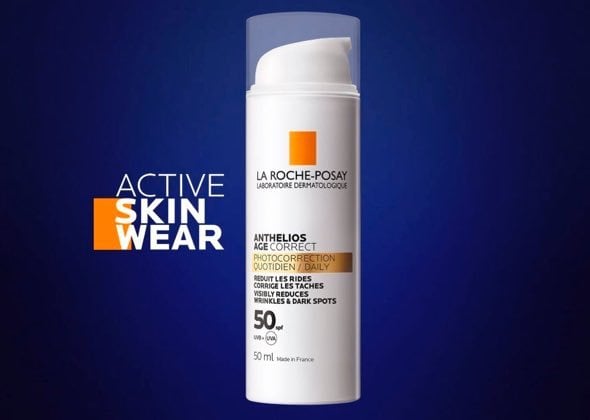What is dry skin?
A dry skin rash is caused by a deficiency of water and lipids at skin’s surface
Dry skin (medical name: Xerosis) is characterised by a lack of water and lipids in the outer layer of your skin, the epidermis. If there is a deficiency of surface lipids, your skin loses its ability to retain water – and it literally dries out, causing a dry skin rash.
Because the skin’s protective outer layer (also called the skin’s barrier) can no longer performs its function as effectively, external irritants (pollution, allergen particles, etc.) can also penetrate more deeply. Skin thus becomes vulnerable and reactive, and is more rapidly and more strongly irritated. Because of this heightened irritation, dry skin can also cause redness.
The result? Your dry skin might start to express some uncomfortable symptoms that, left unchecked, could affect your everyday quality of life:
- Rough to the touch
- Less supple
- Feelings of tightness
- Itching
- Flaking
- Fine lines or cracks
Dry skin most commonly appears on the lower legs, arms, hands, and face. It is not in itself a serious condition but it can feel uncomfortable, and - let’s face it – crocodile skin is not the look we all dream of!
Plus there are also some real downsides – if left untreated, your dry skin may worsen and lead to complications, including skin discolouration, eczema, or even cellulitis (an infection of the tissue under the skin). Damage caused by cracking or excessive scratching can also leave your skin open to secondary infections.
What are the trigger factors for extremely dry skin?
Most factors that trigger dry skin rashes are external, but some are internal too
Anyone can develop dry skin, but there are numerous everyday factors that can make dry skin worse:
- Cold weather: When the air is cold and dry, many people suffer from flaky skin and what is known as 'winter itch'. Dry skin rashes brought on by cold, dry weather can also cause redness of the skin.
- Dry air: Whether you live in the high desert, or merely have the central heating pumping out, low humidity will dry your skin. Many offices have low humidity because of air conditioning and the air on aeroplanes is notoriously dry.
- Water: That sounds crazy, right? Water dries out your skin? Well it's not water per se, it's too much water. Prolonged contact with water will strip away the natural oils that lubricate and protect your skin. Long baths, swimming regularly in chlorinated swimming pools and washing hands repeatedly (for example, if you’re a hairdresser or look after young children, your hands are going to be particularly overexposed to water) all can cause skin dryness.
- Dehydration: Hot days during the summer months, working out too intensely or running long distances, a stomach upset… all of these factors can cause your body to become dehydrated. And dehydration will affect all of your body’s organs, including your skin. If you are severely dehydrated, seek medical advice immediately.
- Harsh soaps and skincare products: Soap is an emulsifier, in other words a substance designed to break down oils. That’s great if you have greasy hands after eating chicken wings, but not so helpful if you're trying to maintain the natural balance of lipids (oils) in your skin. Similarly, skincare products containing alcohol will simply strip your skin dry leaving it parched and miserable.
- Certain medications: Some medicines will dry out your skin. Common examples include isotretinoin (Accutane), which is specifically taken to dry out oily skin, diuretics (“water tablets”) and statins to control cholesterol. If you find that is happening, talk to your doctor.
- Age: The bad news is that most of us experience drier skin as we age. The good news is that there are expert dry and sensitive skin products out there to help keep extremely dry and sensitive skin hydrated, supple and feeling comfortable.
Is it dry skin or eczema? Click HERE to find out the difference So, what is the difference between eczema and dry skin?
Tips to treat dry skin from the dermatologist’s partner brand
Handy lifestyle measures to prevent dry skin rashes
Here are La Roche-Posay’s tips to keeping your dry skin feeling supple and comfortable:
Wash, but don't strip your skin
- Opt for a quick, lukewarm shower rather than a bath
- If you can't live without your bath, make sure it's not too hot (less than 37 °C), and don't soak for more that 10 minutes
- Use a gentle cleansing gel or a lipid-enriched liquid cleanser to neutralize hard water
- Rinse skin thoroughly and dry it by patting gently with a soft towel
- Apply hydration creams and lotions whilst your skin is still damp
La Roche-Posay's LIPIKAR Syndet AP+ is an ultra-gentle cream body wash. Our LIPIKAR Surgras is a soap-free, lipid-enriched cleansing bar. If you adore oil textures, try LIPIKAR Huile Lavante cleansing oil for extremely dry skin. All three are suitable for all the family, including babies.
Moisturise dry skin morning noon and night
Daily moisturising is essential to prevent, and reduce the frequency and intensity of irritation or redness caused by dry skin. Carry a small pot of moisturiser with you, so that you can keep your skin hydrated throughout the day.
Be sure to choose a product that is:
- Hypoallergenic and respectful of the needs of dry and sensitive skin
- Convenient and pleasant to apply, so that it's easy to use on a daily basis
- Hydrating, lipid-restoring, and soothing.
Try using products with different textures to suit the season:
LIPIKAR Lait body milk, and LIPIKAR Baume AP+ moisturising balm are rich, thick moisturisers suitable for use in the evening or in winter.
LIPIKAR Gel-Fluide is a light, hydrating fluid textures suitable for daytime or in summer.
Dress for comfort
Because your clothes are in direct contact with your skin throughout the day, they play an important role in skin’s well-being:
- Natural, soft cottons and silks are breathable and non-irritating
- Synthetic fabrics can make you sweat more, which can increase itching
- Avoid wool next to your skin: It's often too rough, and can cause itching
- In winter, wear gloves and scarves to protect exposed areas from cold, dry air
- Always use rubber gloves when washing up or using household cleaning products
- When laundering your clothes, use a phosphate-free detergent. Avoid softener, and be sure to rinse thoroughly.
Hands and feet can really suffer during the winter months. For extra comfort and protection useLIPIKAR Xerand our soothing, non-greasy hand repair cream, and LIPIKAR Podologics to nourish and smooth cracked feet.
Housekeeping tips to minimise dry skin
Keep the risk of irritation to a minimum by purifying your environment:
- Dust and vacuum regularly to banish dust and mites
- Do not overheat your bedroom (keep it below 19 °C)
- Air rooms every day, in winter and in summer
- Avoid damp rooms with mildew
Pump up the humidity
Especially when the heating is on in winter, place one or two simple humidifiers around your home to boost the moisture content of your air to avoid dry skin rashes.
Feed your skin
Give your extremely dry and sensitive skin a treat by eating a healthy diet rich in essential fatty acids and vitamins A, C, and E, known in particular for their antioxidant action. Make sure you're getting enough of these nutrients by keeping to the “five fruits and vegetables a day” rule and incorporating oily fish or nuts into your diet.








